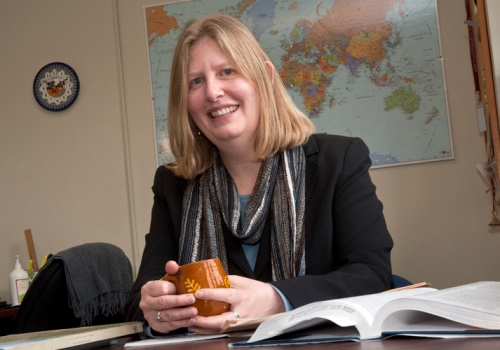
By
A collaboration between Boston College and Hunter College aims to help establish social work as a recognized profession in Afghanistan, by developing national qualification standards and university level curricula at undergraduate and graduate levels.
Eileen Ihrig, who is director of international programs at the BC Graduate School of Social Work, is the co-principal investigator for the project, which will create occupational standards and training systems that focus on child protection. The project will take place through the National Skills Development Program in the Afghanistan Ministry of Labor, Social Affairs, Martyrs and Disabled, funded by a grant from UNICEF.
Ihrig and co-principal investigator Hunter College School of Social Work Associate Professor Martha Bragin, chair of the school’s Global Social Work and Practice with Immigrants and Refugees program, traveled to Afghanistan twice last year to meet ministerial staff and others who are involved in the project. Among those helping to coordinate efforts is Maryanne Loughry, RSM, associate director of the Jesuit Refugee Service Australia and a visiting scholar at GSSW.
The project’s goal for the coming year, said Ihrig, will be to develop curricula for three different professional levels in child protection: social care worker, social worker and social work manager.
Child protection is widely acknowledged as a critical need in Afghanistan, Ihrig said. Years of conflict have eroded traditional family-based structures that protected children. Today, children often face danger from within their own families, as well as from the larger society, says Ihrig.
“You see family violence and child abuse in the home, and then there are other risks, such as forced or early marriage for girls, and forced labor or combat for boys. Afghanistan has many needs, but ensuring that its future generations are able to grow up safe and healthy is certainly a major priority.”
Ihrig acknowledges that the political and social instability in Afghanistan looms as a potential obstacle to the success of this and other initiatives in the National Skills Development Program. She notes that the ministry implementing the program has periodically undergone sweeping administrative and personnel changes.
“When the players change, it obviously affects how the game is played. But when we met the team we are working with on the project, we came away very impressed. They are young Afghanis who are very committed to helping their country. If nobody at least tries to make a change, nothing will change.”
According to Ihrig, the project — part of a larger broad-based international effort to reshape Afghanistan’s social services — reflects a different approach to helping developing nations address social and familial problems.
“We have learned that exporting social work models from the West to another country doesn’t work,” she explained. “You have to gather information from the people on the ground, who are dealing with the issues on a day-in, week-out basis, and find out what they are doing to address the risks to children. Then, working with key stakeholders, you develop the occupational standards and curriculum that will build a strong professional community.
“Social work has not played a major role in the post-World War II era of humanitarian aid and international development. But there is a growing recognition that the field’s academic and professional resources can be enormously helpful to countries that are attempting to cope with crisis and transition. And the global vision of GSSW is bringing Boston College into this discussion.”
Ihrig, who is scheduled to make another visit to Afghanistan tomorrow, said efforts are underway to plan a second phase of the project, involving academic and other support.



